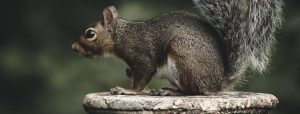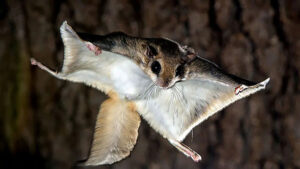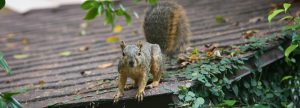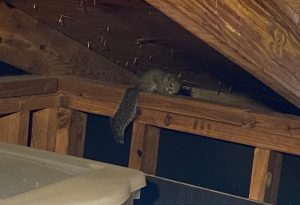Most of us see squirrels on a daily basis, and they usually scurry away whenever a human ventures too close.
But is there ever a scenario where a squirrel will attack a human? The answer is yes.
When Will Squirrels Attack?
Although it is exceedingly rare, squirrels will attack humans. Usually, squirrels will flick their tail back and forth and make rapid chattering noises before attacking.
Squirrels are highly territorial animals, and getting too close to them can trigger defensive behavior. Keep a safe distance.
If you find a squirrel in your attack, do not approach it. Do not try to catch it.
Diseases Spread by Squirrels
With sharp teeth and claws, squirrels can injure you. Squirrels also present a danger because of diseases. Like many rodents, squirrels can carry a wide variety of diseases, many of which can be transmitted to humans.
Although the likelihood of contracting a disease from a squirrel is relatively remote, it is still important to be aware of the diseases they carry, especially for those with compromised immune systems.
- Salmonellosis. Salmonella bacteria are found in squirrel droppings, and if humans are exposed to it they can experience severe gastrointestinal distress, including cramps, vomiting, and diarrhea.
- Ringworm. Ringworm is a highly contagious fungal infection that can be spread via direct or indirect contact. An infected squirrel in your attic can contaminate many surfaces.
- Leptospirosis. This is a bacterial infection that can cause headache, fever, jaundice, and rash.
- Tularemia. This infectious disease attacks the skin, lymph nodes, eyes, and lungs. It can cause fever, chills, headache, fatigue, and muscle aches.
How are Squirrel Diseases Transmitted?
There are several ways squirrels can transmit diseases to humans. They can do so via direct contact, meaning bites or scratches, or through indirect contact, such as contact with urine, feces, or contaminated soil or water. Although squirrel bites and scratches are rare, it is quite easy to get exposed to squirrel waste, especially if squirrels have taken up residence in your home.
The Biggest Danger Squirrels Pose
A squirrel attack is exceedingly rare. While possible, a directly transmitted disease from a squirrel is uncommon. A squirrel in your house is much more likely to indirectly spread disease through droppings, urine, or ectoparasites.
Squirrels pose the biggest danger to your house.
They typically do damage in the following ways:
Nest Building. When squirrels take up residence in an attic, their first order of business is to build a nest—and they have no reservations about using your boxes and papers to do so. They commonly use bits of cardboard and paper as nesting material, which can create a serious mess (and a costly one, especially if the items destroyed were of any importance).
Gnawing Electrical Wire. Squirrels are old pros when it comes to meddling with human electronics (astoundingly, it has been shown that squirrels cause more damage to critical infrastructure than cyber attacks). One of the most dangerous habits of squirrels is their tendency to gnaw on electrical wiring, since a frayed or broken wire in an attic full of wood and insulation increases the risk of a fire considerably.
Insulation Damage. Squirrels damage insulation by both using it to build nests and by using it as a lavatory. As one might expect, this soiled insulation does not smell good and will need to be replaced.
Expert Squirrel Removal
Squirrels can be very persistent. They are rodents, which means they constantly need to chew in order to keep their teeth’s growth in check.
Squirrels can chew through materials like wood, aluminum, plastic, and drywall. For this reason, it is important to maintain a squirrel-free home even after properly sealing a property.
For guaranteed, peace of mind squirrel services, speak with a Trutech Wildlife expert today.








